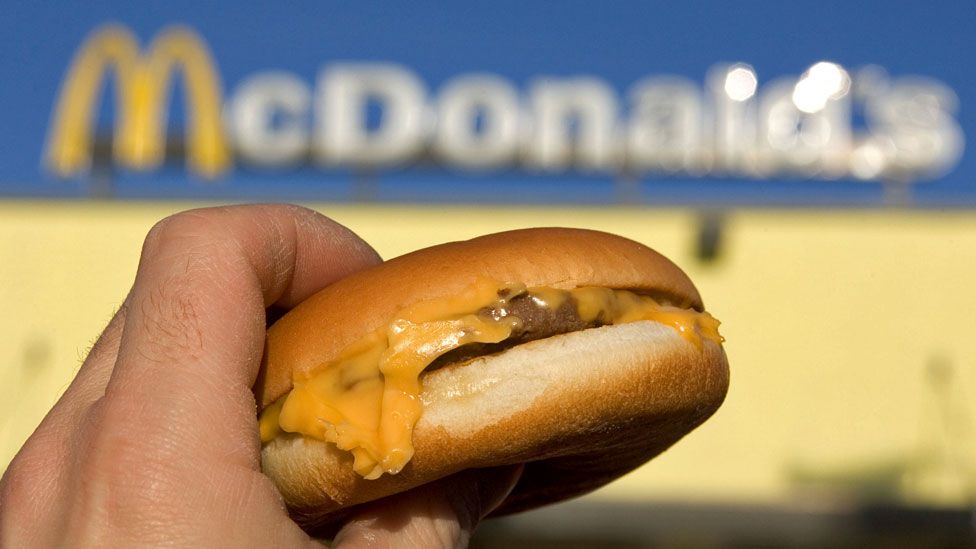McDonald's puts up price of cheeseburger for first time in 14 years
- Published

McDonald's has put up the price of its cheeseburger for the first time in more than 14 years, due to growing cost pressures.
The fast food chain said its UK restaurants would be adding between 10p and 20p to a number of items.
The price of a cheeseburger has increased from 99p to £1.19.
Companies are facing increased costs for things like fuel, wages and ingredients, with prices rising at their fastest rate for 40 years.
In an email to customers, McDonald's UK and Ireland chief executive Alistair Macrow said the company was facing "tough choices" about its prices.
"We understand that any price increases are not good news, but we have delayed and minimised these changes for as long as we could," he said, adding that some prices were unaffected.
Some prices will continue to vary across different restaurants as some are operated by franchisees, who can set prices based on recommendations from McDonald's.
Other items that are increasing in price include breakfast meals, large coffees, McNugget share boxes and upgrades from medium to large meals, the company said.
If the price of a McDonald's cheeseburger had increased in line with inflation it would now cost £1.42.
Where in the world does a Big Mac cost the most?
The Economist has been tracking the cost of a Big Mac around the world since 1986. According to its figures from July, Britain is the 14th most expensive country to buy a Big Mac out of the 54 countries it tracks, costing £3.69 ($4.44)
Here are the top five most expensive countries for a Big Mac in dollars:
1. Switzerland - $6.71
2. Norway - $6.26
3. Uruguay - $6.08
4. Sweden - $5.59
5. Canada - $5.25
McDonald's has more than 36,000 restaurants in more than 100 countries.
On Tuesday, it said it was considering whether to add more discounted menu options because the increased cost of living, particularly in Europe, was leading to some lower-income customers buying cheaper items and fewer big combination meals.
It came as the company reported a jump in global sales of 9.7% for the three months to the end of June, compared with the same period last year.
The war in Ukraine has pushed up the cost of fuel and food, with UK inflation - the rate at which prices rise - hitting 9.4% in June, the highest level for more than 40 years.
Some firms are also having to increase wages to attract and retain staff, with job vacancies at near record highs. However, pay increases are not keeping up with the growing cost of living.
Companies around the world are facing cost pressures, with other countries also affected by high inflation.
On Tuesday, drinks giant Coca-Cola told Bloomberg its global prices had increased by an average of around 5%
It came after Amazon also announced it was increasing prices for customers due to higher costs, with the price of its Prime subscription service rising by £1 a month from September.
KitKat maker Nestle, Marmite maker Unilever and bakery chain Greggs are among those which have already increased prices this year.
Have you been cutting back on things like takeaways due to the rise in the cost of living? Share your experience by emailing [email protected].
Please include a contact number if you are willing to speak to a BBC journalist. You can also get in touch in the following ways:
- WhatsApp: +44 7756 165803
- Tweet: @BBC_HaveYourSay
- Upload your pictures/video here
- Or fill out the form below
- Please read our terms & conditions and privacy policy
If you are reading this page and can't see the form you will need to visit the mobile version of the BBC website to submit your question or comment or you can email us at [email protected]. Please include your name, age and location with any submission.
Related Topics
- Published20 July 2022
- Published26 July 2022
- Published21 April 2022
- Published9 July 2022